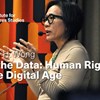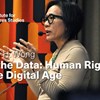wong

Wendy H. Wong: We, the Data - Human Rights in the Digital Age
Research seminar with Wendy H. Wong, Professor of Political Science and Principal's Research Chair at the University of British Columbia. In this talk Wendy H. Wong discusses some of the key themes fr
Wendy H. Wong: We, the Data: Human Rights in the Digital Age
Venue: Institutet för framtidsstudier, Holländargatan 13, 4th floor, Stockholm, or online. Research seminar with Wendy H. Wong, Professor of Political Science and Principal's Research Chair at the UniveThis talk will discuss some of the key themes from We, the Data: Human Rights in the Digital Age, which is a new book published by MIT Press. Human rights are one of the major political innovations of the 20th century. Their emergence after World War II and global uptake promised a new world in which human autonomy, community, dignity, and equality could be protected. Datafication, however, poses some unique challenges for our human rights framework because they are “sticky” and ubiquitous in emerging technologies such as artificial intelligence (AI). The talk focuses on five takeaways from the book that ties AI and data to human rights.

Wendy H. Wong: We, the Data - Human Rights in the Digital Age
Research seminar with Wendy H. Wong, Professor of Political Science and Principal's Research Chair at the University of British Columbia. In this talk Wendy H. Wong discusses some of the key themes fr
Acceptance of group‐based dominance and climate change denial: A cross‐cultural study in Hong Kong, New Zealand, and Sweden
in: Social Psychology Of Climate Change: Special Issue AbstractDespite the importance of overcoming the persistent delay in climate action, almost no research has investigated the psychological underpin

The Wrong of Capitalism Beyond Domination
Political philosophy is witnessing a revival of critiques of capitalism. Against those who argue that capitalism is unjust because of (i) its distributive outcomes, (ii) the oppression of workers at t
Age Discrimination: Is It Special? Is it Wrong?
In Bognar, G & A. Gosseries (red.) Ageing without Ageism? Conceptual Puzzles and Policy Proposals. Oxford Academic. Abstract This chapter examines the moral status of age discrimination by bringing t
Are Private Prisons Intrinsically Wrong? An Analysis
Jus Cogens, vol. 6 Abstract Several critics have argued that private prisons are not only problematic because of their worse effects but also intrinsically wrong. This article analyzes two prominent arg
Radical right-wing parties in Europe: What populism got to do with it?
Journal of Language and Politics, Volume 16, Issue 4, pp. 485–496. Abstract In this paper I discuss, critically, the literature on populism and the extent to which it applies to the contemporary radical
Climate Change Denial among Radical Right-Wing Supporters
i: Sustainability The linkage between political right-wing orientation and climate change denial is extensively studied. However, previous research has almost exclusively focused on the mainstream righ= 2216), a mainstream right-wing party (the Conservative Party,,= 634), and a mainstream center-left party (Social Democrats,= 548) in Sweden. Across the analyses, distrust of public service media (Swedish Television,), socioeconomic right-wing attitudes, and antifeminist attitudes outperformed the effects of anti-immigration attitudes and political distrust in explaining climate change denial, perhaps because of a lesser distinguishing capability of the latter mentioned variables. For example, virtually all Sweden Democrat supporters oppose immigration. Furthermore, the effects of party support, conservative ideologies, and belief in conspiracies were relatively weak, and vanished or substantially weakened in the full models. Our results suggest that socioeconomic attitudes (characteristic for the mainstream right) and exclusionary sociocultural attitudes and institutional distrust (characteristic for the contemporary European radical right) are important predictors of climate change denial, and more important than party support per se.
Swedish Fertility Swings and Public Expenditure for Children
This paper studies whether Swedish fertility swings and variation in public expenditure for children are related events. Amongst the results, there are indications that the age group 25-29 is most sen








